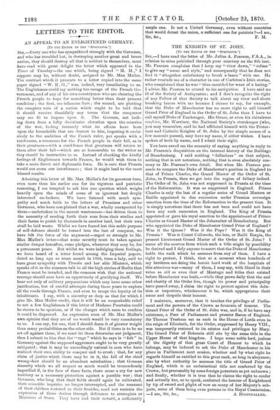THE KNIGHTS OF ST. JOHN.
[TO THE EDITOR OF THE "SPECTATOR.']
SER.,-4 have read the letter of Mr. Julius A. Pearson, F.S.A., in relation to mine published through your courtesy on the 8th inst. Mr. Pearson complains that I keep my " vizor down," " refuse " to give my "name and style," and consequently that he does not find it "altogether satisfactory to break a lance " with me. He rather reminds me of a character in one of Carleton's Irish stories, who complained that he was " blue-moulded for want of a bating." I advise Mr. Pearson to attend to his antiquities. I have said no ill of the Society of Antiquaries ; and I don't recognize the right of any Fellow of that Society to talk about my vizor and about breaking lances with me because I choose to say, for example, that the Duke of Manchester has no more right to call himself Grand Prior of England in the Order of St. John than I have to call myself Duke of Tanderagee. His Grace, or even his chivalrous confrere, Mr. Warriner, the National Society's storekeeper (who, you may remember, said he had affiliated himself with the Protes- tant and Catholic Knights of St. John by the simple means of a few masonic passes), may have my name, if either wishes. I have spoken of both by name, and I admit their right.
You have saved me the necessity of saying anything in reply to Mr. Pearson's disquisition on the internal history of the Bailliage of Brandenburg. I said nothing " fallacious" on that subject, nothing that is not notorious, nothing that is even absolutely con- trary to Mr. Pearson's own detail. But when Mr. Pearson pro- ceeds to compare the Duke of Manchester's position in England to that of Prince Charles, the Grand Master of the Order of St. John, in Prussia, then we get into the region of fallacy indeed. The Order of St. John was not suppressed in Prussia at the time of the Reformation. It was so suppressed in England. Prince Charles is only the last of a regular series of Grand Masters or Baillis appointed in due succession under Prussian sovereign sanction from the time of the Reformation to the present time. It is simply notorious that there has not been and could not have been any such succession in England. The King of Prussia appointed or gave his royal sanction to the appointment of Prince Charles as Grand Master of the Johanniter of Brandenburg. But who appointed the Duke of Manchester Grand Prior of England ? Was it the Queen? Was it the Pope ? Was it the King of Prussia ? Was it Count Colloredo, the late, or Bailli Borgia, the present Lieutenant Grand Master of the Order of St. John ? I name all the sources from which such a title might by possibility be derived and I defy anyone to assert that the Duke of Manchester holds the rank which he assumes from any of them. I have a right to protest, I think, that at a moment when hundreds of my brethren are doing the heroic hard work of the hospitals of this atrocious war—many of them, I may say, with blood in their veins as old as even that of Montagu and titles that existed before Manchester was built,—while they prove daily that the zeal and charity of the Order live, though its power and principality have passed away, I claim the right to protest against this delu- sion or imposture, whichsoever it be, which appropriates their name and despoils their honour.
I maintain, moreover, that it touches the privilege of Parlia- ment and the powers of the Crown as fountain of honour. The Grand Prior of the Order of St. John was, and is, if he have any existence, a Peer of Parliament and premier Baron of England. Sir Thomas Tresham sat as such in the House of Lords even in the reign of Elizabeth, for the Order, suppressed by Henry VIII., was temporarily restored to its estates and privileges by Mary. The Grand Prior of Bohemia still sits by the same title in the Upper House of that kingdom. I hope some noble lord, jealous of the dignity of that great Court of Honour to which he belongs, may be induced to ask the Duke of Manchester in his place in Parliament next session, whether and by what right he regards himself as entitled to this great rank, so long in abeyance; also by what authority he assumes the title of Grand Prior of England, which is an ecclesiastical title not conferred by the Crown, but presumably by some foreign potentate as yet unknown ; and finally, whether it is true that he claims the right to confer and actually has, so to speak, conferred the honour of Knighthood by tip of sword and plight of vow on many of her Majesty's sub- jects, some of them being even persons in the Royal Commission.


































 Previous page
Previous page